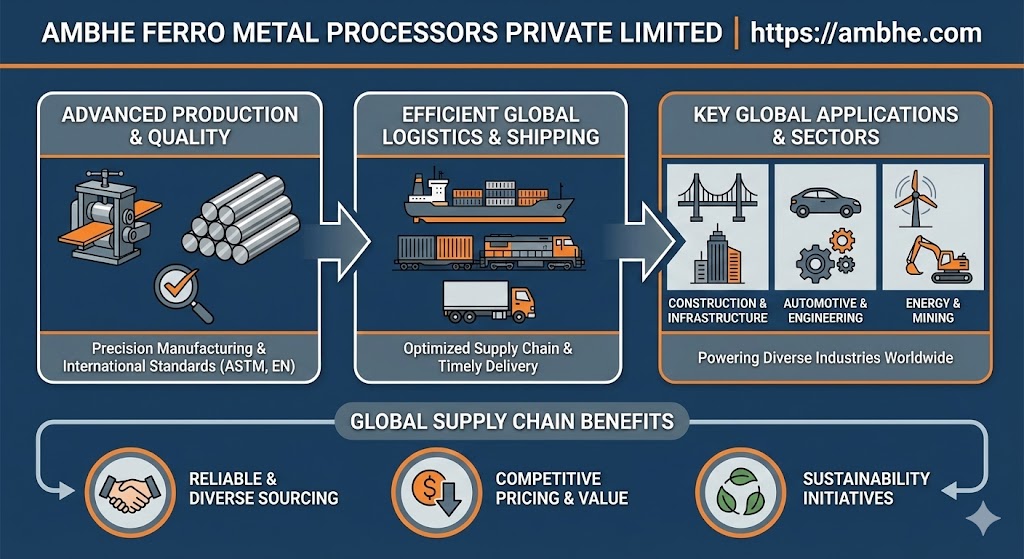STEEL EXPORT
STEEL EXPORT

India has a large amount of iron ore reserves. Coupled with other advantages such as the scope of increase of per capita steel consumption makes India an exiting destination for the steel industry. A lot of steel export happens from India.
The world steel industry is geared towards providing steel in bulk and with huge shipment times. The products are restricted to certain grades and in certain fixed lengths such as 6m.
This leaves small consumers who receive urgent orders of customised products few options to source steel in a regular cost effective manner.
We can provide steel in custom grades, sizes and lengths in container loads. Some of the products we can provide are Rounds, Bright Bars, Hexagons, Flats, Rectangular Steel Bars, Crane Rails, Dowell Bars, etc. We can also provide various customised chemical compositions if the requirement is regular.
Kindly contact with your requirements to Ashish Gupta on +91 9987364999 or email at ashish@ambhe.com for your requirements
STEEL EXPORT FROM INDIA
India is one of the leading exporters of steel in the world. The country has a robust steel industry that is driven by a combination of domestic demand and exports. In recent years, India’s steel exports have been on the rise, driven by a growing global demand for steel and the country’s competitive advantage in terms of cost and quality.
India’s steel exports are primarily composed of semi-finished and finished steel products. The country’s top steel exports include long steel products such as bars, rods, and wire, as well as flat steel products such as plates and sheets. These products are used in a wide range of applications, including construction, manufacturing, and machinery.
One of the main drivers of India’s steel exports is the country’s competitive cost advantage. India has a relatively low cost of production due to factors such as low labor costs, low energy costs, and a large domestic market for raw materials. This allows Indian steel manufacturers to produce steel at a lower cost than many of their international competitors, making them well-positioned to compete in the global market.
Another key driver of India’s steel exports is the country’s quality advantage. India’s steel industry has made significant investments in technology and research and development, which has led to the production of high-quality steel products that are competitive with those produced by other countries. This has helped to establish India’s reputation as a reliable supplier of steel products.
India’s steel exports are primarily directed to developed countries such as the United States, Europe, and Japan. However, in recent years, the country has also been expanding its exports to other regions, such as Southeast Asia and Africa. This is driven by the growing demand for steel in these regions, as well as the country’s competitive advantage in terms of cost and quality.
In addition to exports, India’s steel industry also plays an important role in the domestic market. The country has a large domestic market for steel products, driven by the rapid growth of its construction, manufacturing, and infrastructure sectors. This has led to the development of a robust steel industry that is well-positioned to meet both domestic and export demand.
Despite the benefits of India’s steel exports, there are also several challenges that the industry faces. One of the main challenges is the high level of competition in the global steel market. This is driven by a large number of steel-producing countries, as well as a growing number of imports into India. This has led to a challenging environment for Indian steel manufacturers, who are facing increasing pressure to remain competitive in terms of cost and quality.
Another challenge facing India’s steel exports is the volatility of global steel prices. The steel industry is highly dependent on global demand and prices, which can fluctuate significantly. This can lead to uncertainty and volatility in the market, making it difficult for Indian steel manufacturers to plan and manage their operations.